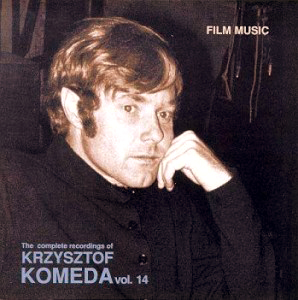
Dresden is the capital city of the German state of Saxony and its second most populous city, after Leipzig. It is the 12th most populous city of Germany, the fourth largest by area, and the third most populous city in the area of former East Germany, following only (East) Berlin and Leipzig. Dresden's urban area comprises the towns of Freital, Pirna, Radebeul, Coswig and Heidenau and has around 790,000 inhabitants. The Dresden metropolitan area has approximately 1.34 million inhabitants.
Jazz standards are musical compositions that are an important part of the musical repertoire of jazz musicians, in that they are widely known, performed, and recorded by jazz musicians, and widely known by listeners. There is no definitive list of jazz standards, and the list of songs deemed to be standards changes over time. Songs included in major fake book publications and jazz reference works offer a rough guide to which songs are considered standards.

Krzysztof Komeda was a Polish film music composer and jazz pianist. Perhaps best known for his work in film scores, Komeda wrote the scores for Roman Polanski’s films Knife in the Water (1962), Cul-de-sac (1966), The Fearless Vampire Killers (1967), and Rosemary’s Baby (1968). Komeda's album Astigmatic (1965) is widely regarded as one of the most important European jazz albums; British critic Stuart Nicholson describes the album as "marking a shift away from the dominant American approach with the emergence of a specific European aesthetic."
Benjamin "Buzzy" Drootin was a jazz drummer.

"Tiger Rag" is a jazz standard that was recorded and copyrighted by the Original Dixieland Jass Band in 1917. It is one of the most recorded jazz compositions. In 2003, the 1918 recording of "Tiger Rag" was entered into the U.S. Library of Congress National Recording Registry.

Max Kaminsky was a jazz trumpeter and bandleader.
The Tarragona International Dixieland Festival was started in Tarragona, Catalonia, Spain, in 1994, where since the restoration of democratic local governments jazz had been recovered as a stable form within the different cultural programs during the year. As other Catalan and Spanish cities already had jazz festivals in a generic sense, the Town Hall of Tarragona opted to specialize in Dixieland. That is to say, the starting point of jazz, the most traditional jazz, which involved some thematic innovation.
Czechoslovakia's jazz roots were established by Jaroslav Ježek and Rudolf Antonín Dvorský in the 1920s and 1930s. Ježek's influence in this realm is particularly noted and by the time he immigrated to the United States in 1939, his compositions blending jazz and classical music were among the most popular music. After the invasion of Czechoslovakia by the Nazis, however, jazz was banned and it was not until 1947 when the Australian jazz pianist Graeme Bell and his Dixieland Jazz Band performed at a World Youth Festival in Prague that the jazz movement was revived.

Harry Gold, born Hyman Goldberg, was an English British Dixieland jazz saxophonist and bandleader.
An overview of the evolution of Jazz music in Germany reveals that the development of jazz in Germany and its public notice differ from the "motherland" of jazz, the US, in several respects.

Eugene Conners, known as Gene Conners, was an American trombonist and singer. He was known as the "Mighty Flea".

The "Carl Maria von Weber" College of Music is a college of music in Dresden, Germany.
Dixieland, sometimes referred to as hot jazz or traditional jazz, is a style of jazz based on the music that developed in New Orleans at the start of the 20th century.

Jazz – musical style that originated at the beginning of the 20th century in African American communities in the Southern United States, mixing African music and European classical music traditions.

The history of jazz in Belgium starts with the Dinant instrument maker Adolphe Sax, whose saxophone became part of military bands in New Orleans around 1900 and would develop into the jazz instrument par excellence. From then on the early history of jazz in Belgium virtually runs parallel to developments in the country of the birth of jazz, from the minstrel shows in the late 19th century until the first Belgian jazz album in 1927 and beyond.
The Belgrade Dixieland Orchestra, (BDO) founded in Belgrade in 2001, is one of the best-known and most popular jazz orchestras in Serbia. It has evolved from the original Ljubomir Matijaca Dixieland Band, which was the only group of this musical orientation in Serbia in the last decades of the 20th century.
Charles H. "Charly" Höllering was a German jazz musician, notable for playing the clarinet and tenor saxophone, and graphic designer.

The following outline is provided as an overview of and topical guide to Dresden:

Uralskiy Dixieland is an oldest traditional jazz bands in Russia. The band was formed in Chelyabinsk in 1969 under the aegis of the regional Philharmonic under the leadership of jazz musician and trumpeter Igor Bourco. Over the years, the band has performed throughout Russia, former USSR, and most European countries. Uralskiy Dixieland is the winner of the All-Union Contest of Variety Artists and international jazz festivals in Tbilisi (1978), Moscow (1984), Baku (1985), etc.











